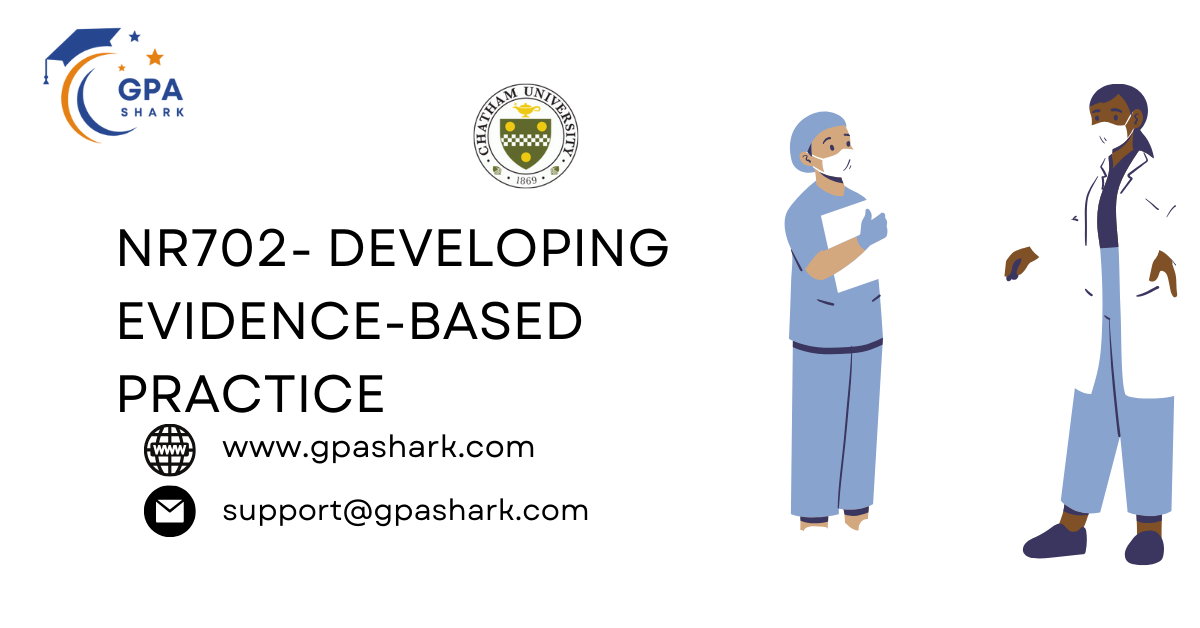One of the critical courses in advanced nursing programs is NR702 – Developing Evidence-Based Practice. This course equips students with the essential skills and competencies to assimilate knowledge for scholarly work. Here’s a comprehensive overview of what NR702 entails and how it prepares nursing professionals for evidence-based practice.
Table of Contents
NR702- Developing Evidence-Based Practice Course Overview
NR702 – Developing Evidence-Based Practice is designed to prepare students with the necessary skills to identify clinical problems and find the best evidence from established research studies to support practice change projects. The course emphasizes the following key areas:
- Identification of Clinical Problems
- Finding Best Evidence for Interventions
- Supporting Practice Change Projects
Key Components of NR702- Developing Evidence-Based Practice
Identification of Clinical Problems
Clinical Assessment:
- Problem Identification: Learn to assess clinical settings and identify significant problems that require intervention.
- Needs Analysis: Conduct a thorough needs analysis to determine the impact of the identified problem on patient care and outcomes.
Prioritization:
- Problem Prioritization: Develop skills to prioritize clinical problems based on their severity, frequency, and impact on patient health.
- Stakeholder Involvement: Engage with stakeholders, including patients, healthcare providers, and administrators, to understand their perspectives on the identified problems.
Finding Best Evidence for Interventions
Research Skills:
- Literature Review: Conduct comprehensive literature reviews to find existing research and evidence related to the identified clinical problems.
- Database Utilization: Utilize reputable databases such as PubMed, CINAHL, and Cochrane Library to source relevant research studies.
Critical Appraisal:
- Appraising Evidence: Develop skills to critically appraise the quality and relevance of research studies.
- Synthesis of Evidence: Learn to synthesize findings from multiple studies to form a cohesive understanding of the best available evidence.
Supporting Practice Change Projects
Evidence Integration:
- Translating Evidence into Practice: Learn to translate research evidence into practical interventions that can be implemented in clinical settings.
- Intervention Design: Design interventions based on the best available evidence to address the identified clinical problems.
Implementation and Evaluation:
- Implementation Strategies: Develop strategies for implementing practice change projects, including planning, communication, and resource allocation.
- Evaluation and Feedback: Learn to evaluate the effectiveness of implemented interventions and gather feedback to make necessary adjustments.
Importance of NR702 in Nursing Education
Foundation for Scholarly Work:
- Knowledge Assimilation: Equip yourself with the skills to assimilate and apply knowledge for scholarly work and advanced practice.
- Research Integration: Learn to integrate research findings into clinical practice to promote evidence-based care.
Professional Development:
- Leadership Skills: Enhance your ability to lead practice change projects and improve patient outcomes.
- Clinical Competence: Build clinical competence by applying evidence-based interventions in real-world settings.
Quality Improvement:
- Practice Improvement: Use evidence-based practice to identify areas for quality improvement and implement effective changes in healthcare delivery.
- Patient Outcomes: Focus on improving patient outcomes through the application of research-based interventions.
FAQ: NR702 – Developing Evidence-Based Practice
What is NR702 – Developing Evidence-Based Practice?
NR702 – Developing Evidence-Based Practice is a course designed to equip students with the skills and competencies necessary to identify clinical problems and find the best evidence from established research studies to support practice change projects. The course emphasizes the integration of research findings into clinical practice to improve patient outcomes.
What are the main objectives of NR702?
The main objectives of NR702 are to:
Identify clinical problems that require intervention.
Conduct comprehensive literature reviews to find the best evidence.
Critically appraise research studies for quality and relevance.
Design and implement evidence-based interventions.
Evaluate the effectiveness of practice change projects.
How does NR702 prepare students for evidence-based practice?
NR702 prepares students for evidence-based practice by:
Developing Research Skills: Teaching students how to conduct thorough literature reviews and use reputable databases to find relevant research.
Critical Appraisal: Training students to critically evaluate the quality and applicability of research findings.
Evidence Integration: Guiding students on how to translate research evidence into practical interventions in clinical settings.
Implementation Strategies: Providing strategies for effectively implementing and evaluating practice change projects.
What are the key components of NR702?
The key components of NR702 include:
Identification of Clinical Problems: Learning to assess and prioritize clinical issues that need intervention.
Finding Best Evidence for Interventions: Conducting literature reviews and using databases to source relevant research studies.
Critical Appraisal of Evidence: Developing skills to appraise the quality and relevance of research.
Supporting Practice Change Projects: Designing, implementing, and evaluating evidence-based interventions.

